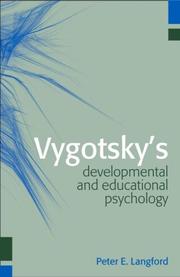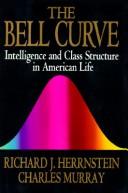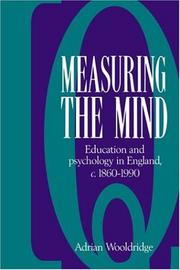| Listing 1 - 5 of 5 |
Sort by
|
Book
ISBN: 9782090395068 Year: 2024 Publisher: Paris CLE international
Abstract | Keywords | Export | Availability | Bookmark
 Loading...
Loading...Choose an application
- Reference Manager
- EndNote
- RefWorks (Direct export to RefWorks)
School management --- Didactics of French --- Français langue étrangère. --- Innovation --- Enseignement --- Pédagogie expérimentale. --- Pédagogie. --- Innovations.

ISBN: 1841692719 9781841692715 9780203499573 9781135426415 9781135426453 9781135426460 9780415653176 Year: 2005 Publisher: Hove Psychology press
Abstract | Keywords | Export | Availability | Bookmark
 Loading...
Loading...Choose an application
- Reference Manager
- EndNote
- RefWorks (Direct export to RefWorks)
Development (Psychology) --- Developmental psychology --- Développement [Psychologie du ] --- Educational psychology --- Onderwijspsychologie --- Ontwikkelingspsychologie --- Psychologie [Ontwikkelings] --- Psychologie de l'éducation --- Psychologie du développement --- Psychologie pédagogique --- Psychopedagogie --- Psychopedagogy --- Psychopédagogie --- Pédagogie expérimentale --- Developmental psychology. --- Educational psychology. --- Vygotskiĭ, L. S. --- Vygotskii, Lev Semenovich --- Education --- Psychology, Educational --- Psychology --- Vygotskiĭ, L. S. --- Wygotski, Lew Semjonowitsch, --- Vygotsky, L. S. --- Vygotskiĭ, Lev Semenovich, --- Vygotsky, Lev Semenovich, --- Vygotskij, Lev Semenovic, --- Wigotsky, L., --- Vigotski, Lev S., --- Vigotski, L. S. --- Wei-ko-tzʻu-chi, Lieh Hsieh, --- Wygotski, L. S. --- Vygotski, Lev Sémionovitch, --- Выготский, Л. С. --- ויגוצקי, לב, --- Vigotszkij, L. Sz., --- Child psychology --- Developmental psychobiology --- Life cycle, Human --- Child Development. --- Psychological Theory. --- Psychology, Educational. --- Vygotsky, Lev --- Vygotskiĭ, L. S. - (Lev Semenovich), - 1896-1934.
Book
ISBN: 2264040173 9782264040176 Year: 2004 Volume: 3730 Publisher: Paris: 10/18,
Abstract | Keywords | Export | Availability | Bookmark
 Loading...
Loading...Choose an application
- Reference Manager
- EndNote
- RefWorks (Direct export to RefWorks)
En 1818, Joseph Jacotot, révolutionnaire exilé et lecteur de littérature française à l'université de Louvain, commença à semer la panique dans l'Europe savante. Non content d'avoir appris le français à des étudiants flamands sans leur donner aucune leçon, il se mit à enseigner ce qu'il ignorait et à proclamer le mot d'ordre de l'émancipation intellectuelle : tous les hommes ont une égale intelligence. Il ne s'agit pas de pédagogie amusante, mais de philosophie et de politique. Jacques Rancière offre, à travers la biographie de ce personnage étonnant, une réflexion philosophique originale sur l'éducation. La grande leçon de Jacotot est que l'instruction est comme la liberté elle ne se donne pas, elle se prend. (Quatrième de couverture)
Educators --- Education --- Educateurs --- Biography --- Philosophy --- Parent participation --- Biographie --- Philosophie --- Participation des parents --- Jacotot, Jean-Joseph, --- pedagogie --- Jacotot Joseph --- filosofie --- politiek --- 37 --- classe ouvrière --- Enseignement universitaire --- Université de Louvain --- Teaching --- Aims and objectives --- Aids and devices --- Enseignement --- Pédagogie --- Jacotot, Jean Joseph --- Intelligence. --- Éducation --- Intellect. --- Méthodes expérimentales. --- Philosophie. --- Experimental methods. --- Jacotot, Joseph --- Educators - France - Biography --- Education - Philosophy --- Education - Parent participation - France --- Educateurs - France - Biographie --- Education - Philosophie --- Education - Participation des parents - France --- Education - Aims and objectives --- Teaching - Aids and devices --- Jacotot, Jean-Joseph, - 1770-1840 --- Pédagogie expérimentale. --- Pédagogie expérimentale. --- Éducation

ISBN: 0029146739 9780029146736 Year: 1994 Publisher: New York (N.Y.) Free Press
Abstract | Keywords | Export | Availability | Bookmark
 Loading...
Loading...Choose an application
- Reference Manager
- EndNote
- RefWorks (Direct export to RefWorks)
Social stratification --- Sociology of culture --- United States --- Educational psychology --- Environment --- Environnement et hérédité --- Genetic and environment --- Heredity and environment --- Human intelligence --- Intellect --- Intelligence --- Milieu en erfelijkheid --- Mind --- Nature and nurture --- Nature versus nurture --- Nature--Nurture --- Nurture and nature --- Onderwijspsychologie --- Psychologie de l'éducation --- Psychologie pédagogique --- Psychopedagogie --- Psychopedagogy --- Psychopédagogie --- Pédagogie expérimentale --- Verstand --- Intellect. --- Nature and nurture. --- Intelligence levels --- Educational psychology. --- Social aspects --- -Educational psychology --- -Intelligence levels --- -316.342.2 --- 159.9 --- 316.6 --- Intelligence Intelligentie --- Psychologie Psychologie --- Société Maatschappij --- Information (communication) Informatie (communicatie) --- Education Opvoeding --- Tests Tests --- intelligentie --- onderwijssociologie --- 316.342.2 --- Intelligence quotient --- IQ (Intelligence quotient) --- Education --- Psychology, Educational --- Psychology --- Child psychology --- Genetics and environment --- Nature --- Genetics --- Heredity --- Human beings --- Ability --- Mental retardation --- Thought and thinking --- -Sociale klassen --- Nurture --- Effect of environment on --- Experimentele psychologie --- leren en intelligentie --- leren en intelligentie. --- 316.342.2 Sociale klassen --- Sociale klassen --- Environment and genetics --- Environment and heredity --- Intelligence levels - United States. --- Intelligence levels - Social aspects - United States. --- United States of America

ISBN: 0521395151 0521026180 0511659997 Year: 1994 Publisher: Cambridge Cambridge University press
Abstract | Keywords | Export | Availability | Bookmark
 Loading...
Loading...Choose an application
- Reference Manager
- EndNote
- RefWorks (Direct export to RefWorks)
The central claim of Measuring the Mind is that, contrary to popular opinion, the psychologists who dominated educational policy-making between the wars were educational progressives and political radicals. They argued that education should reflect the requirements of children rather than the convenience of adults, and regarded intelligence testing as an instrument of child-centred education. These psychologists owed their political inspiration to the meritocratic ideal and lost popularity with the waning of this ideal after the war. Four main themes dominate the discussion: the emergence of educational psychology as a distinct discipline; the recent history of ideas about children's mental development; the role of experts in formulating educational policy; and the rise and fall of the measurement of merit.
Educational psychology --- Onderwijspsychologie --- Psychologie de l'éducation --- Psychologie pédagogique --- Psychopedagogie --- Psychopedagogy --- Psychopédagogie --- Pédagogie expérimentale --- Educational tests and measurements --- -Educational psychology --- Education --- -Education --- -#PEDA *015.3 <420> --- #PEDA *1 <091> --- #PEDA *015.35 <420> --- #PEDA *1.014 <420> --- #PEDA *1.212 --- #PEDA *1.014.53 <420> --- #PEDA *P 025.61 --- Children --- Education, Primitive --- Education of children --- Human resource development --- Instruction --- Pedagogy --- Schooling --- Students --- Youth --- Civilization --- Learning and scholarship --- Mental discipline --- Schools --- Teaching --- Training --- Psychology, Educational --- Psychology --- Child psychology --- Educational assessment --- Educational measurements --- Mental tests --- Tests and measurements in education --- Psychological tests for children --- Psychometrics --- Examinations --- Psychological tests --- History --- Social aspects --- -History --- Political aspects --- Rating of --- Burt, Cyril Lodowic --- Educational psychology. --- History. --- #PEDA *015.3 <420> --- Political aspects&delete& --- Social aspects&delete& --- Burt, Cyril, --- England --- Educational tests and measurements - England - History. --- Education - Social aspects - England - History. --- Education - Political aspects - England - History. --- Social Sciences --- Political Science
| Listing 1 - 5 of 5 |
Sort by
|

 Search
Search Feedback
Feedback About UniCat
About UniCat  Help
Help News
News